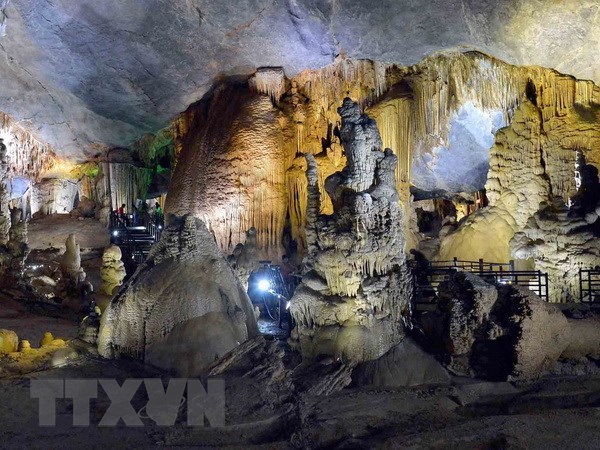
Additional 44 caves have been discovered in Phong Nha – Ke Bang National Park in the central province of Quang Binh, raising the total caves found so far in this area to 405, according to the park’s management board.

Inside a cave in Phong Nha - Ke Bang National Park (Source: VNA)
Of those, 33 are located in Dan Hoa, Hoa Son, Trung Hoa and
Thuong Hoa communes in Minh Hoa district, nine are in Son Trach commune, Bo
Trach district and the remaining in Truong Son and Truong Xuan communes, Quang
Ninh district.
As part of the six geological strata of La Khe, Bac Son, Mu Gia, Cat Dang, Muc
Bai and Le Ninh, mostly in La Khe and Bac Son that cover the largest area, the
caves are 44-602m from the seawater level.
Stalactites of different shapes have also been recorded there.
Vo Van Tri, head of the park’s Science and International Cooperation Office,
said it is necessary to conduct an in-depth study to better understand values
of newly-found caves, contributing to their sustainable preservation and
exploitation.
Dubbed the "Kingdom of Caves”, Phong Nha – Ke Bang National Park was declared a
World Natural Heritage by UNESCO twice in July 2003 and July 2015 thanks to its
impressive scenery and archeological value.
It is also home to Son Doong cave, which was recognised in 2016 as the largest
of its kind by three international organisations, including the UK-based
Guinness World Records, Hong Kong-based World Record Association, and the US
and India-based World Kings.
As of mid-July, tourist arrivals in Quang Binh reached nearly 1.9 million, up
about 17 percent year-on-year, bringing an estimated revenue of 2 trillion VND
(88.8 million USD), marking a year-on-year increase of 15 percent.
In 2018, Quang Binh strives to greet 3.5 million tourists by the end of the
year, including 120,000 foreigners.
Source: VNA
Located just a 20-minute drive from Hoa Binh City, Ora Hill Farmstay & Glamping Hoa Binh is a captivating new destination nestled in Mo hamlet, Bình Thanh commune, Cao Phong district. Combining farming with leisure, this tranquil retreat is perfect for those seeking balance, joy, and an immersive experience in the expansive beauty of nature.
Muong Bi - Tan Lac is renowned as one of the four famous Muong regions in Hoa Binh province. Blessed by nature with a favourable climate and stunning landscapes, Tan Lac holds great advantages for tourism development. The local tourism industry has made remarkable strides in recent times thanks to the attention and support from the local authorities and sectors.
With its strategic location, well-developed transport network, and diverse soil and climatic conditions, Hoa Binh is emerging as a must-visit destination in Vietnam's northwestern tourism corridor. The province boasts numerous attractions, including the Kim Boi hot springs (Kim Boi district), the Dau Rong cave complex (Cao Phong), the Mai Chau valley (Mai Chau), and the iconic Hoa Binh hydropower plant.
The northern mountainous province of Hoa Binh has been listed among the 71 most beautiful places to visit worldwide by the prestigious US travel magazine Condé Nast Traveller.
Hoa Binh province’s rich natural and cultural resources position it as a prime location for developing community-based tourism (CBT). In recent years, support from central and provincial policies, as well as assistance from non-governmental organisations, have encouraged local ethnic minority and mountainous communities to actively engage in the sector.



